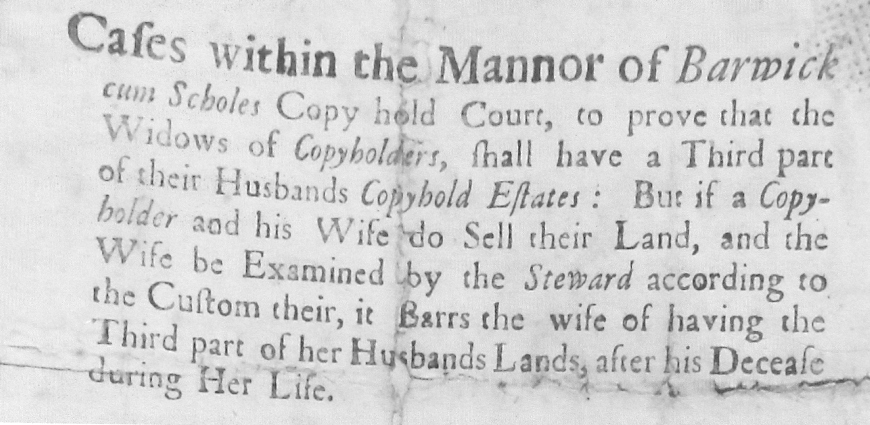

|
Cases within the Mannor of Barwick Cum Scholes Copy hold Court, to prove that the Widows of Copvholders, shall have a Third part Of their Husbands Copyhold Estates : But if a Copy- Holder and his Wife do Sell their Land and the Wife be Examined by the Steward according to Custom their, it Barrs the wife of having the Third part of her Husbands Lands, after his Decease During Her Life. |
|
Widow Settle has had the thirds of her husbands estate paid her in money this 40 Years. Witness Tho. Settle Widow Haigh who married a widow of a copyholder, had the third part of her first husbands estate paid unto him during his Wife's Life. Witness Will, Haigh Widow Hardcastle has the third part of her husband's estate paid unto her, and has had it about 20 years. Witness Joseph Silkston and Joseph Haigh Mrs Briggs had the third part of her husband's estate paid her in money during her life. Witness Will Collett Edward Knapton 's wife had the third part of her husbund 's estate set out/or her about 20 years since, after her husbands decease, her husband having sold his land in his wife's life time. Witness Tho. Knapton Marv Vevers had the third part of her husband's estate after she married her second husband during her life. Witness Will. Vevers Mary Taylor the widow of John Taylor has the third part of her husband's land set out for her estate and has had it for about 27 hours. Witness Will. Collet and Tho. Settle John Glover (who was Rich. Glover's son) paid Anne Glover, his mother, the third part of his father's estate as long as he lived. Witness John Brookes Note, the actions to recover the third part of the land for the widows must be brought in the Lords Court Baron of the Manor for no other ways at law is the third part of her Lands to be recovered. And when the Widow has recovered the third part of the lands, must be set out by the Jury and Bayliff. And that the Probate of Wills and granting of Administrations of intestate estates of all persons dying within the Manor ought to be proved before the Steward of the Court of the said Manor and the Administrations to be Granted by him. |